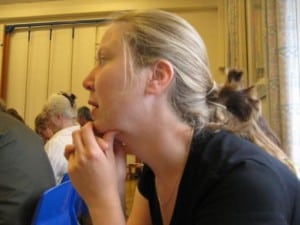Breastfeeding mothers who need to sit an exam can feel concerned about how to manage separation from their babies while they might need a feed, as well as how to avoid the health risks of not removing enough milk from their breasts.
One of the first routes may be to talk to the examiner and explain the situation. It may be possible to make special arrangements to accommodate breastfeeding.
Shorter length exams
Mothers who have to take exams of around three to four hours have found various ways of coping.
When Anna found her exam was scheduled for three weeks after her baby’s birth, she asked for an invigilator to come to her home. She arranged for another carer to be there for the baby, nursed just before the exam started, and then took the three-hour exam without a break, finishing just as the baby was ready for a feed. It was the longest the baby had ever gone between feeds!
Claire needed to take an exam when her baby was five weeks old. She built up a supply of expressed milk beforehand, just in case the baby got upset, and during the exam her mother put the baby in a sling and went for a long walk. Claire had arranged beforehand that if her baby got upset her mother would text the invigilator, who would quietly take Claire out of the room. She would be allowed to nurse the baby, in the company of another staff member and without speaking to anyone, before returning the baby to her mother. Claire got through the exam without being called, but says the first feed afterwards was wonderful!
One mother of twins arranged beforehand for a set break to go and nurse her babies.
International Board of Lactation Consultant Examiners
IBLCE exam candidates normally sit a continuous four-hour computer based exam. Breastfeeding mothers of babies under 12 months can arrange a scheduled break. For a baby older than 12 months there is an extra charge to cover the cost of an extra proctor to be with them while away from the exam centre. Some mothers of younger babies have found they could arrange to have their baby in a nearby room with a carer.
Further information can be found here.
What about longer exams?
Some mothers find they are unable to avoid taking a long exam while still breastfeeding and it has sometimes proved difficult to arrange adequate breaks for expressing. While provision can be made for examinees with specific needs to have extra breaks, the needs of breastfeeding mothers have not been specifically addressed in this context in the past. However, in 2007, a US mother fought a decision not to allow breaks for expressing milk when she had to take a long medical exam and the court found in her favour. It ruled that the issue was one of gender discrimination and nursing mothers should be given extra break time to express milk during long exams.
Possible legal routes within GB
If a woman is told she cannot express her milk during exams, the first route might be to explain the potential health consequences, such as engorgement and mastitis. The following acts might help.
Equality Act 2010
According to the Equality Act of 2010, treating a woman unfavourably because she is breastfeeding a child of any age is considered sex discrimination. Having to sit an exam in increasing discomfort and with the possibility of health consequences might be considered unfavourable treatment. A mother might be able to bring up the issue of sex discrimination as a relevant factor in the decision to allow her to take pumping breaks. If she is denied such breaks, she can contact the Government Equalities Office. A solicitor can advise on whether a claim can be brought for discrimination under the 2010 Equality Act.
Human Rights Act
It may also be possible to object under Article 8 of the Human Rights Act which regulates the right to respect for private and family life. Amongst other things, this applies to a woman’s right to physical integrity and autonomy, i.e. what she does and doesn’t do with her own body. A mother might also argue under Article 3 that it is inhuman and degrading to be prevented from removing milk from her body, particularly if she is refused the right to pump. A mother would need to make it clear that she is being put at serious health risk by not being allowed to express breastmilk.
After the exam
As Claire found, after the exam breastfeeding provides a way for mother and baby to reconnect. The baby may be a little more fussy and may want to nurse more, but any drop in milk production should soon be resolved. Prior communication about the situation, an understanding of why a break may be needed, and good planning can all help to ensure taking the exam goes as smoothly as possible.
Written by Anna Burbidge and Johanna Rhys-Davies
Copyright LLLGB 2016

